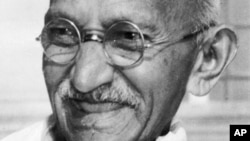NEW DELHI — India has bought a collection of letters and other documents relating to Mahatma Gandhi, which were set to be auctioned in London. The archive is expected to shed new light on the Indian independence leader.
The letters, photographs and other papers bought by the Indian government belonged to Hermann Kallenbach, a German Jewish architect whom Mahatma Gandhi met in South Africa in 1904 and with whom he became close friends.
Before Sotheby's could auction the collection off Tuesday in London, the Indian government struck a deal to buy the archive for $ 1.1 million from Kallenbach’s relatives.
A handful of the thousands of documents are written by Gandhi, himself. The rest are written by his friends and family.
Mushirul Hasan heads the National Archives in New Delhi, where the correspondence relating to Gandhi will be kept. He says the government bought the collection because the papers are of historical significance and should be in India. The collection spans five decades, including the 20 years the Indian leader spent in South Africa.
“It’s an important collection - more so because it deals with the years in South Africa and there is some wonderful correspondence between him and his sons and Kallenbach," said Hassan. "These are early years. These are formative years. So anything connected with his stay in South Africa is very revealing.”
Mahatma Gandhi’s time in South Africa is believed to have deeply shaped his thinking. It was there that he began his civil rights work and developed the concept of non-violent resistance after encountering discrimination.
The independence leader’s great grandson Tushar Gandhi, who lives in Mumbai, says the correspondence will provide valuable insight to researchers into the life of Gandhi, who is also known in India as “Bapu” or "father."
“This was one of his first very close friendships, with Herman Kallenbach, at a time when Bapu [Gandhi] was evolving into a public figure from a private lawyer, and so this would have a lot of insight into that process of evolution," Tushar Gandhi said. "The friendship spanned a long period of his lifetime, so it also would reflect on his personal state during that period.”
The documents also give an insight into his life in India after returning from South Africa.
A controversial biography of Gandhi by Pulitzer Prize winning author Joseph Lelyveld, published last year, alluded to an intimate relationship between Kallenbach and Gandhi and raised a storm of protest in India. Some reviewers said the book cited correspondence which suggested that the two men had had a homosexual affair. The author denied it.
An Indian historian had discovered the letters at the home of Kallenbach’s grand niece.
In the past, India has complained about private auctions of Gandhi’s belongings. In 2009, an Indian businessman bought some of his possessions which had been put up for auction in New York. India says the Mahatma’s heritage belongs to the country.
The letters, photographs and other papers bought by the Indian government belonged to Hermann Kallenbach, a German Jewish architect whom Mahatma Gandhi met in South Africa in 1904 and with whom he became close friends.
Before Sotheby's could auction the collection off Tuesday in London, the Indian government struck a deal to buy the archive for $ 1.1 million from Kallenbach’s relatives.
A handful of the thousands of documents are written by Gandhi, himself. The rest are written by his friends and family.
Mushirul Hasan heads the National Archives in New Delhi, where the correspondence relating to Gandhi will be kept. He says the government bought the collection because the papers are of historical significance and should be in India. The collection spans five decades, including the 20 years the Indian leader spent in South Africa.
“It’s an important collection - more so because it deals with the years in South Africa and there is some wonderful correspondence between him and his sons and Kallenbach," said Hassan. "These are early years. These are formative years. So anything connected with his stay in South Africa is very revealing.”
Mahatma Gandhi’s time in South Africa is believed to have deeply shaped his thinking. It was there that he began his civil rights work and developed the concept of non-violent resistance after encountering discrimination.
The independence leader’s great grandson Tushar Gandhi, who lives in Mumbai, says the correspondence will provide valuable insight to researchers into the life of Gandhi, who is also known in India as “Bapu” or "father."
“This was one of his first very close friendships, with Herman Kallenbach, at a time when Bapu [Gandhi] was evolving into a public figure from a private lawyer, and so this would have a lot of insight into that process of evolution," Tushar Gandhi said. "The friendship spanned a long period of his lifetime, so it also would reflect on his personal state during that period.”
The documents also give an insight into his life in India after returning from South Africa.
A controversial biography of Gandhi by Pulitzer Prize winning author Joseph Lelyveld, published last year, alluded to an intimate relationship between Kallenbach and Gandhi and raised a storm of protest in India. Some reviewers said the book cited correspondence which suggested that the two men had had a homosexual affair. The author denied it.
An Indian historian had discovered the letters at the home of Kallenbach’s grand niece.
In the past, India has complained about private auctions of Gandhi’s belongings. In 2009, an Indian businessman bought some of his possessions which had been put up for auction in New York. India says the Mahatma’s heritage belongs to the country.




